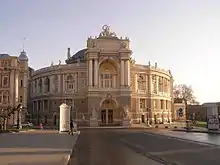| Subject classification: this is an engineering resource. |
Architecture is the art and science of designing buildings, urban spaces, interior design and all open or closed spaces.

Architecture is both the process and product of planning, designing and constructing space that reflects functional, social, and aesthetic considerations. It requires the manipulation and coordination of material, technology, light, and shadow. Architecture also encompasses the pragmatic aspects of realizing designed spaces, such as project planning,structural design, cost estimating and construction administration. A wider definition may comprise all design activity from the macro-level (urban design, landscape architecture) to the micro-level (construction details and furniture). In fact, architecture today may refer to the activity of designing any kind of system and is often used in the IT world.[1]
Architectural works are often perceived as cultural and political symbols and as works of art. Historical civilizations are often identified with their surviving architectural achievements.
In other words, architecture is a profession basically aimed at harmonizing human, environment and nature. Globally, architecture is a central component of development, in terms of the built environment.
See also
- School:Architecture
- MIT: Architecture Courses
References
- ↑ Karakina, Yelena; Tatyana Samoilova, Anna Ishchenko (2004). Touring Odessa. BDRUK. ISBN 966-8137-01-9.